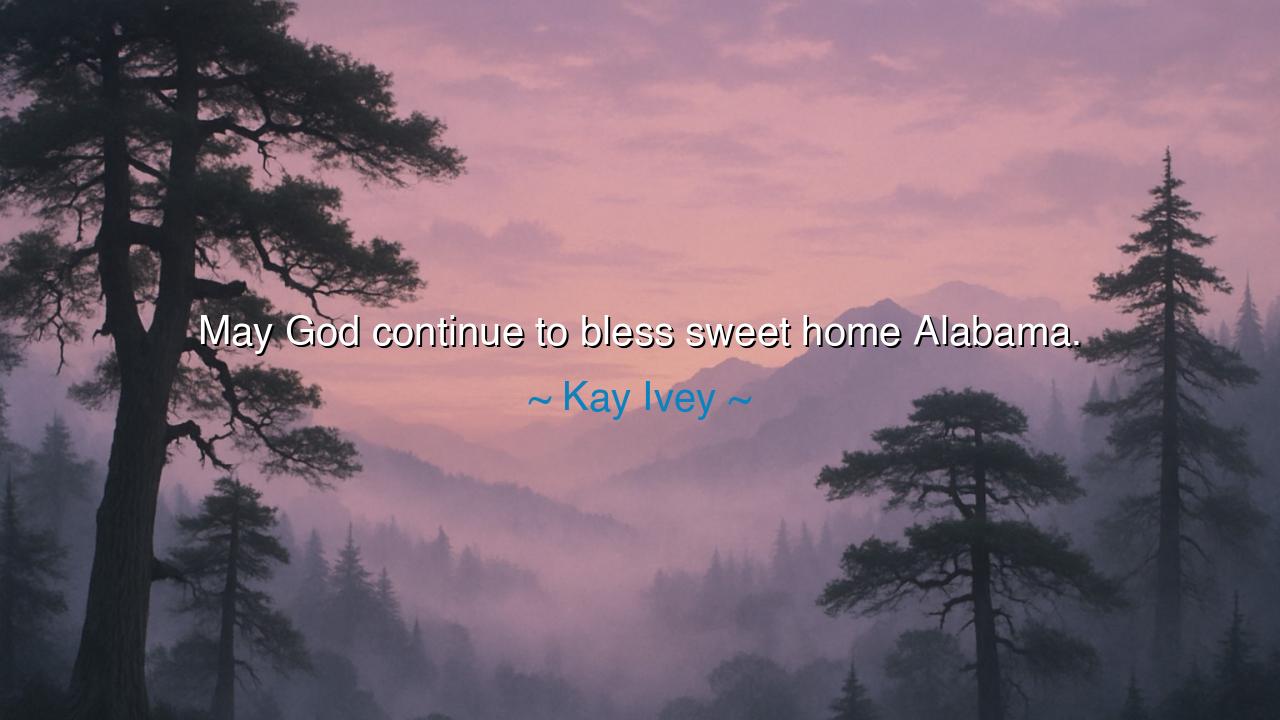
May God continue to bless sweet home Alabama.






When Kay Ivey, governor of Alabama, uttered the words “May God continue to bless sweet home Alabama,” she was not merely closing a speech — she was invoking a prayer older than any government, deeper than any policy, and as enduring as the land itself. In this simple benediction, there breathes the ancient voice of gratitude, the yearning for divine favor upon one’s homeland. It is a call to remembrance — that no matter how modern the world becomes, the bond between people, faith, and home remains sacred. These words echo the timeless truth that to love one’s home is to honor the soil that shaped one’s soul.
The phrase “sweet home Alabama” carries a melody of belonging. It was born first in song, in the rhythm of Southern hearts and fields, and later became a phrase of identity — a symbol of resilience and pride. When Kay Ivey spoke it, she was not only quoting a line of music; she was calling upon the spirit of her people, those who have toiled, prayed, and persevered through hardship. The blessing of God she invokes is more than ceremonial; it is a plea for guidance, for grace upon a land with a complicated history — a place of beauty and struggle, of shadow and light. Like the ancients who stood upon their mountains and prayed for rain upon their valleys, she stood upon the ground of Alabama and called down mercy and favor upon her homeland.
To the ancients, home was not merely a location — it was a sacred trust. The Greeks spoke of oikos, the household, as the foundation of civilization. The Romans had their household gods, Lares and Penates, who guarded the hearth. And so too, in the heart of Alabama, there burns that same sacred fire — a belief that the destiny of a people is bound to the virtue of their home. To ask for God’s blessing upon one’s land is to acknowledge that human hands alone cannot sustain it. The crops may fail, the storms may come, but the faith of the people remains the anchor. Thus, when Ivey said “May God continue to bless sweet home Alabama,” she spoke as one of those ancient keepers of the hearth, asking heaven to remember her people.
History offers countless tales of leaders who turned to divine blessing in times of uncertainty. Consider Abraham Lincoln, who during the blood and smoke of the Civil War, declared days of prayer and fasting for a divided nation. He knew that to rebuild not only the country’s soil but its spirit required something beyond law and labor — it required grace. Alabama, too, has known its trials: the pain of history, the tension between its past and future. Yet through it all, its people have sung, prayed, and hoped. The blessing invoked by Ivey is not an empty platitude but a continuation of that long prayer — that the past might teach, not chain; that the future might heal, not divide.
And so, dear listener, what does this teach us? It teaches that to love one’s home is not to ignore its flaws, but to believe it can be redeemed. True patriotism — the kind that the ancients and the wise have always cherished — is not blind pride but enduring hope. To bless one’s homeland is to say, “We will not abandon you in your imperfection. We will work, we will pray, we will build.” Whether your home is a great state or a small village, this blessing can be yours: to labor for it, to protect it, to call upon the divine for its flourishing.
In this spirit, let each of us become guardians of our own “sweet home,” wherever it may be. Let us walk its streets with gratitude, speak of it with tenderness, and serve it with honor. For a home is not blessed by the words of leaders alone, but by the actions of its people. Plant trees that will shade future generations. Feed the hungry within your walls. Teach your children to love the land that sustains them. When the people act with goodness, the blessing Kay Ivey invoked becomes not just a wish but a living truth.
Thus, remember this teaching: to bless one’s home is to bind oneself to it in love and service. When Kay Ivey said, “May God continue to bless sweet home Alabama,” she was not only asking for divine favor — she was calling her people to live in such a way that the blessing might continue. So may we all, in our own corners of the world, lift our eyes to heaven and say with gratitude and purpose: May God continue to bless the place we call home — not only with words, but through the goodness of our hands and the steadfastness of our hearts.






AAdministratorAdministrator
Welcome, honored guests. Please leave a comment, we will respond soon